高中英语学业水平测试复习专题一情景交际课时教学课件
文档属性
| 名称 | 高中英语学业水平测试复习专题一情景交际课时教学课件 |

|
|
| 格式 | ppt | ||
| 文件大小 | 2.9MB | ||
| 资源类型 | 试卷 | ||
| 版本资源 | 通用版 | ||
| 科目 | 英语 | ||
| 更新时间 | 2025-03-16 00:00:00 | ||
图片预览

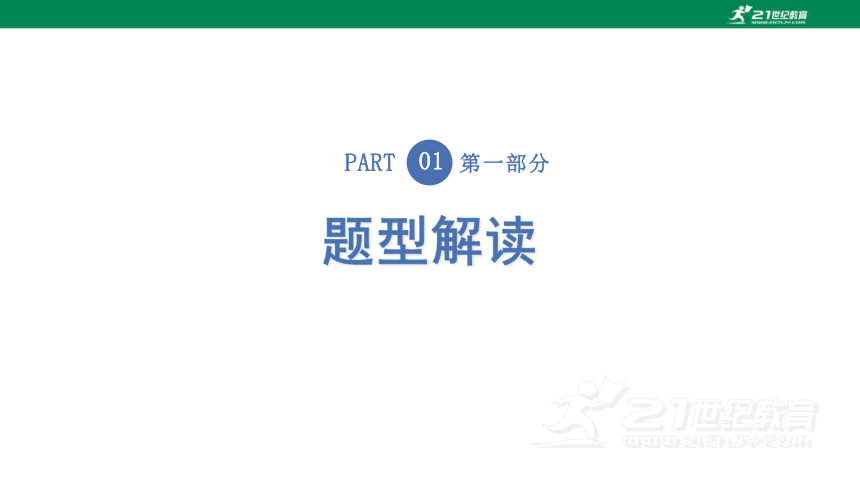
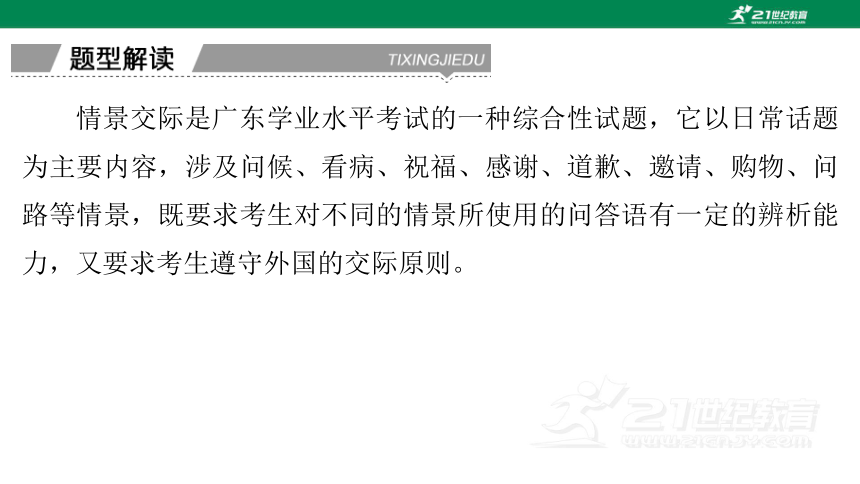
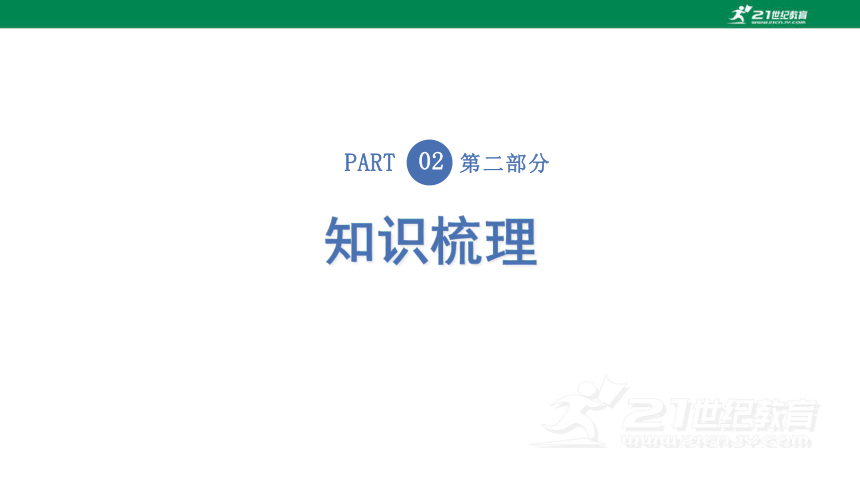
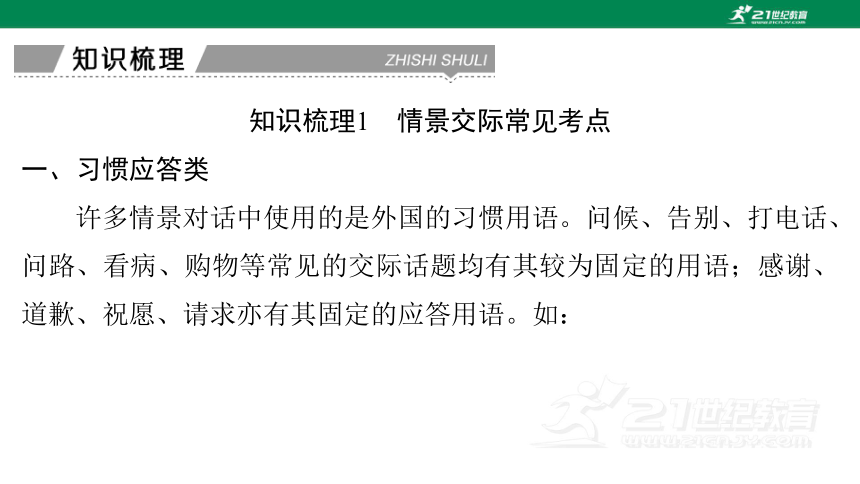
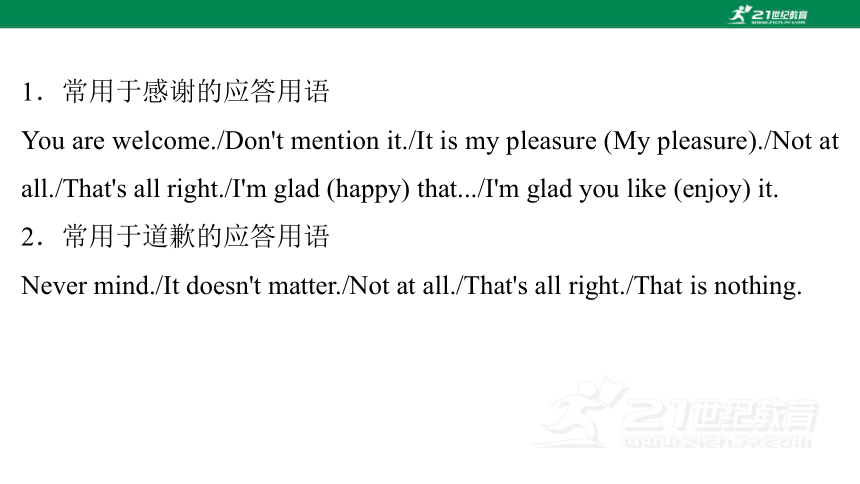
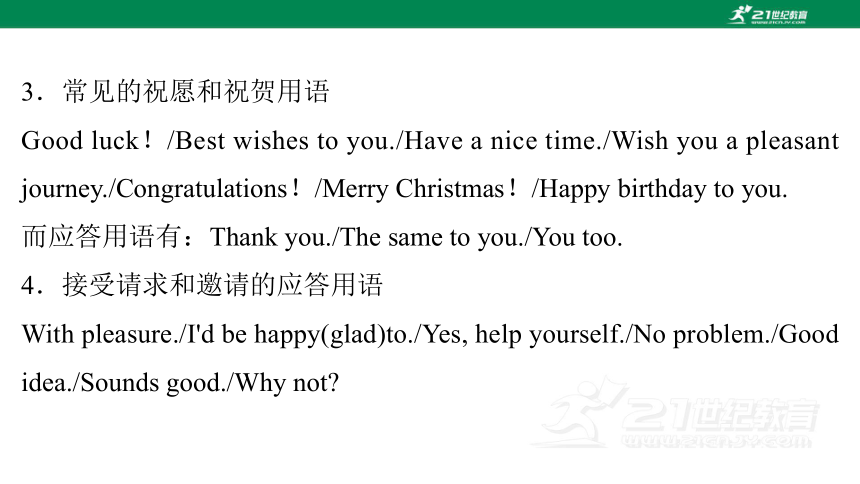
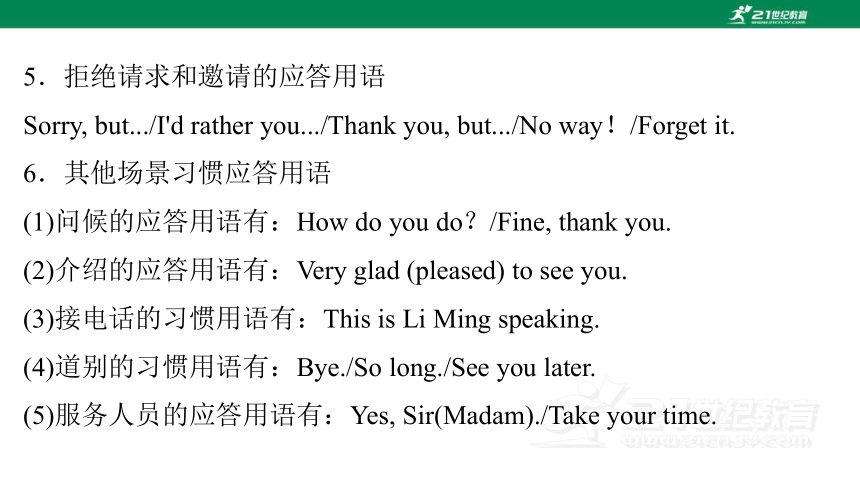
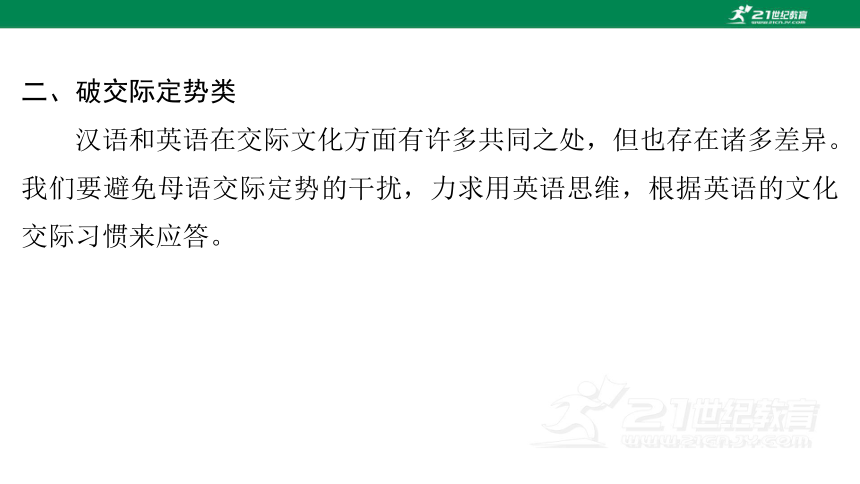
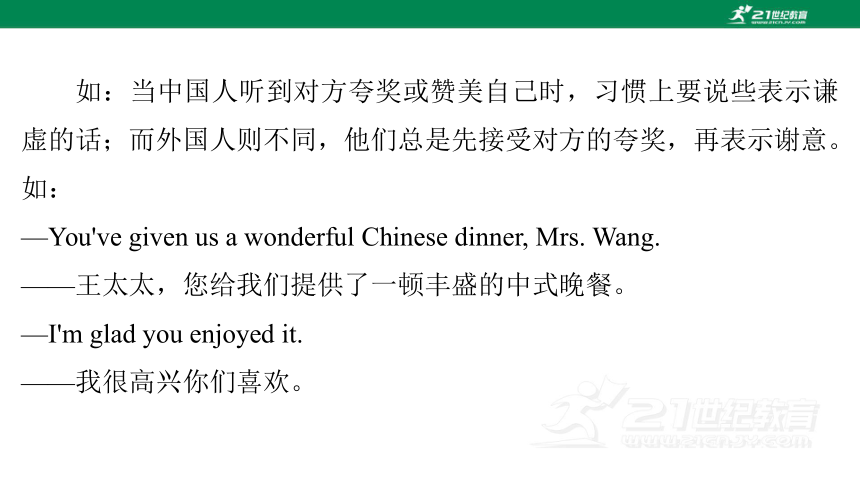
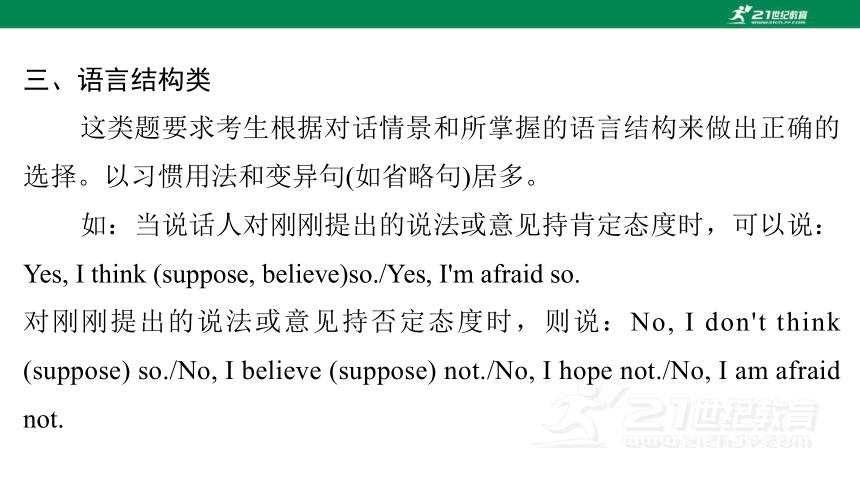
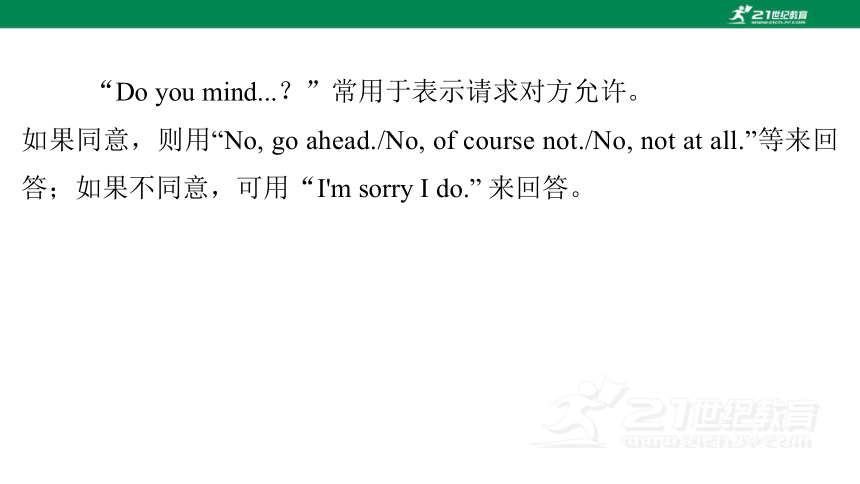
文档简介
(共119张PPT)
第二部分 专题突破
专题一 情景交际
题型解读
PART
01
第一部分
情景交际是广东学业水平考试的一种综合性试题,它以日常话题为主要内容,涉及问候、看病、祝福、感谢、道歉、邀请、购物、问路等情景,既要求考生对不同的情景所使用的问答语有一定的辨析能力,又要求考生遵守外国的交际原则。
知识梳理
PART
02
第二部分
知识梳理1 情景交际常见考点
一、习惯应答类
许多情景对话中使用的是外国的习惯用语。问候、告别、打电话、问路、看病、购物等常见的交际话题均有其较为固定的用语;感谢、道歉、祝愿、请求亦有其固定的应答用语。如:
1.常用于感谢的应答用语
You are welcome./Don't mention it./It is my pleasure (My pleasure)./Not at all./That's all right./I'm glad (happy) that.../I'm glad you like (enjoy) it.
2.常用于道歉的应答用语
Never mind./It doesn't matter./Not at all./That's all right./That is nothing.
3.常见的祝愿和祝贺用语
Good luck!/Best wishes to you./Have a nice time./Wish you a pleasant journey./Congratulations!/Merry Christmas!/Happy birthday to you.
而应答用语有:Thank you./The same to you./You too.
4.接受请求和邀请的应答用语
With pleasure./I'd be happy(glad)to./Yes, help yourself./No problem./Good idea./Sounds good./Why not
5.拒绝请求和邀请的应答用语
Sorry, but.../I'd rather you.../Thank you, but.../No way!/Forget it.
6.其他场景习惯应答用语
(1)问候的应答用语有:How do you do?/Fine, thank you.
(2)介绍的应答用语有:Very glad (pleased) to see you.
(3)接电话的习惯用语有:This is Li Ming speaking.
(4)道别的习惯用语有:Bye./So long./See you later.
(5)服务人员的应答用语有:Yes, Sir(Madam)./Take your time.
二、破交际定势类
汉语和英语在交际文化方面有许多共同之处,但也存在诸多差异。我们要避免母语交际定势的干扰,力求用英语思维,根据英语的文化交际习惯来应答。
如:当中国人听到对方夸奖或赞美自己时,习惯上要说些表示谦虚的话;而外国人则不同,他们总是先接受对方的夸奖,再表示谢意。如:
—You've given us a wonderful Chinese dinner, Mrs. Wang.
——王太太,您给我们提供了一顿丰盛的中式晚餐。
—I'm glad you enjoyed it.
——我很高兴你们喜欢。
三、语言结构类
这类题要求考生根据对话情景和所掌握的语言结构来做出正确的选择。以习惯用法和变异句(如省略句)居多。
如:当说话人对刚刚提出的说法或意见持肯定态度时,可以说:Yes, I think (suppose, believe)so./Yes, I'm afraid so.
对刚刚提出的说法或意见持否定态度时,则说:No, I don't think (suppose) so./No, I believe (suppose) not./No, I hope not./No, I am afraid not.
“Do you mind...?”常用于表示请求对方允许。
如果同意,则用“No, go ahead./No, of course not./No, not at all.”等来回答;如果不同意,可用“I'm sorry I do.” 来回答。
四、情景用语类
根据不同的交际情景,说话者会采用不同的交际用语来表达自己的态度和情感。如:
表示不肯定或没把握的用语有:I am afraid that.../It depends.
表示不耐烦和催促的用语有:Well, well./Come on./Hurry up!
表示惊奇和有把握的用语有:No wonder.../No doubt...
如:
—What do you want to do next We have half an hour before the basketball game starts.
——接下来你准备做什么?在篮球赛开始之前我们还有半小时。
—It's up to you. Whatever you want to do is fine with me.
——这取决于你。你想做什么我都同意。
知识梳理2 情景交际分类讲解
一、表示问候的交际用语
1.直接问候
一般打招呼用语,答语通常是重复对方的话:
Hello./Hi!/Good morning(afternoon, evening).
2.初次见面打招呼的用语:How do you do?/Glad to meet you.
答语也是:How do you do?/Glad to meet you.
3.对一段时间内没有见面的熟人可用以下句型:How are you?/How have you been
答语是:Fine, thank you. And you
4.向认识但不常见面的人打招呼,可用以下表达:How's everything with you?/How is everything going?/How are you getting on?/What's up
答语可用:Pretty well./Very well./Everything is OK./Not too bad.
5.对于不认识的人想要叫他(她)停下来时,可用以下说法:Hey, sir (madam)./Just a moment, sir (madam).
6.间接问候
(1)Please give one's [one's代表不同人称的物主代词(如:my, our...)] regards/best wishes/love to...意为“请向……致以最美好的祝愿。”;Please remember me to sb.意为“请代我向某人问好”。
(2)Say hi/hello to...(from me)意为“向……问候”,与Please give my best regards/wishes to...意思相近。
对于上述问候,其答语为:Of course./Sure, I will等。
二、表示介绍的交际用语
介绍某人的常用表达式
I'll introduce...to you./I want to introduce.../May I introduce you to...?/I'd like you to meet.../It's with great pleasure that I introduce...to you./Let me introduce you to.../By the way, do you know...
答语为:
How do you do?/I'm pleased to know you./Very glad to meet you./Nice to meet you./It's a pleasure to meet you.
三、表示请求的交际用语
1.用May (Can, Could)来表达
肯定回答:Yes, you may (can)./Certainly.(=Of course./Sure.)/Yes, do please.
注意:上述回答中can不能换成could,因为could在一般疑问句中表示委婉的请求,而在肯定句中,则无此功能。
否定回答:No, you mustn't./No, you can't./No, you'd better not./Please don't./Sorry, I'm afraid not.
2.用Shall来表达
肯定回答:Yes, I'd like to./All right.(=OK.)/(That's a) Good idea./Yes, let's...
否定回答:Please don't./I don't think so./I'm afraid not.
3.用Would、Will、Would(Will)you please...?/Would you like...?来表达
肯定回答:Yes, I'd like to.(=Yes, I'd love to.=Yes, I'll be glad to.)/With pleasure.
否定回答:I'd like (love) to, but I'm busy./I'm sorry, but I'm busy./I'm afraid not./I'd really like to, but I have no time.
四、表示告别的交际用语
1.告别前用语
I'm afraid I must be off/be going/be leaving now./I think I must be off/be going/be leaving now./Well, it's getting late./I've got to go now./Maybe we could get together sometime.
2.对告别前用语的回答
Thank you for coming./Yes, I've enjoy it./My pleasure, too./Could you stay a little longer?/In that case, I won't keep you.
3.告别用语
Good -bye!/Be seeing you soon. Bye!/Bye for now./See you./See you later./Bye -bye!/Good night./Have a pleasant journey!/Wish you a pleasant journey./Don't forget to give me a ring.
4.对告别用语的回答
Good- bye!/Good night!/Same to you./So long. Take care.
五、表示邀请与应答的交际用语
1.用一般疑问句形式
Will/Would/Can/Could you come to...
指被邀请人接受的可能性较大。表示“你可以……吗?”如:
Will you come to take part in my party
你会来参加我的聚会吗?
Would you like+名词(代词)/动词不定式/sb.+动词不定式?
此句型表示“你愿意……?/你是否愿意……?”,此时邀请人不知对方是否接受邀请,是商量、询问及试探性的邀请、请求或表示个人的想法、看法。
如:
A:Would you like to go there with him
你愿意与他一起去那里吗?
B:Yes, I'd like (love) to.好的,我愿意。
肯定回答:Yes, I'd be happy to./Yes, it's very kind/nice of you (to invite me).
2.用陈述句形式
I'd like sb. to do sth./I'd like you to come to...这是向某人发出邀请的常见句式。表示 “希望某人做某事”,常与would 连用,是一种客气的邀请。
如:
A:I'd like to invite you to see a film with me. 我想请你和我一起去看电影。
B:I'd like (love) to, but I'm very busy.
我很想去,但我很忙。
委婉拒绝表达:I'd love to...I'm afraid.../Thank you for inviting me./It's very kind of you to invite me, but I'm busy.
六、表示请求允许和应答的交际用语
1.Can/Could/May I...?表示“我可不可以……?”
这是请求对方允许自己做某事的最常见的交际用语;其中Could I...?语气最委婉;May I...?常用在比较正式的场合;Can I...?用得最广泛。
肯定回答:Yes./Sure./Certainly./Of course, you may./Yes, do please./Go ahead, please./That's OK./All right.
否定回答:No, please don't./I'm sorry you can't./I'm sorry, but.../You'd better not...
2.Do you mind if I do...?这是用来表示“请求许可”的交际用语。句中的mind意为“介意、反对”。表示“如果我做某事,你反对/介意吗?”或“我做某事可以吗?”
注意:当我们用“Do you mind if...”时,if从句中的谓语动词一般用现在时;当我们用“Would you mind if...”时,if从句中的谓语动词一般用过去时,这时语气更加委婉。
肯定回答:No, I don't mind./Certainly not./Of course not./No, go ahead./Not at all.
否定回答:I'm sorry you can't.../I'm afraid.../I'm afraid it's not allowed.
3.I wonder if I could/can...?也是用来表示“请求许可”的交际用语。句中的wonder意为“想知道”,后面常跟if从句。表示“我想知道我是否可以……?”,用以委婉地提出请求。
肯定回答:Sure, go ahead./Yes, please do./Yes./Of course./Certainly.
否定回答:I'm sorry, but.../I'm afraid not./No, please don't./You'd better not...
七、表示感谢与应答的交际用语
常用表达式
1.Thank you./Thanks./Thank you very much./Thank you so much./
Thanks a lot./Thank you very much indeed./Thanks a million./I don't know how to thank you./I'm really grateful to you./That's most kind of you./You're kind!
2.Thank you just the same./Thank you all the same./It's very considerate of you./It's most thoughtful of you.
答语:You're welcome./Not at all./Don't mention it./It's my pleasure./No trouble at all./It was the least I could do./I'm glad I could do it./That's all right./I'm delighted to have been able to do that for you./It's really nothing at all.
八、表示祝愿、祝贺及应答的交际用语
1.当某人取得成功时
A:I have passed the examination!
我已经通过考试了!
B:Congratulations (to you)! 祝贺你!
2.当某人外出旅行时
Good luck with your trip! 祝您旅途平安!
Have a good trip/journey.=I wish you a good trip(journey)./Good trip to you./Nice journey to you. 祝你旅途愉快。
Have a nice/pleasant/wonderful time.
=I wish you a nice/pleasant/wonderful time.
祝你过得愉快。
3.当某人生日时
A:Happy birthday to you! 生日快乐!
B:Thank you! 谢谢!
4.当某人即将做某事时
A:I will take the exams tomorrow.
我明天将参加考试。
B:Good luck (to you)!(I wish you success!)祝你顺利!(祝你成功!)
答语:Thanks./Thank you./Thanks a lot./ It's kind of you to say so.
5.当重大节日到来时
A:Happy New Year!新年快乐!
B:Thanks! The same to you!(Happy New Year to you, too!)谢谢!你也一样!(也祝你新年快乐!)
九、表示赞美和应答的交际用语
常用表达式
1.It's beautiful./That's marvellous!/It's a lovely picture!/I'm glad you did.../I'm pleased you did.../How clever of you!/I like the way you did.../I admire the way you do.../I've never seen such a(n).../What a nice coat you have!/You look very smart today!/What a wonderful house!/It matches your suit perfectly./You've certainly given us a very good lecture./You have a beautiful smile./You have a good sense of humour./You gave an excellent speech./This is a lovely dinner./You look wonderful this evening!/What a nice living room!/I appreciate your...
2.对朋友的精彩表演、杰出成绩,你若亲临现场,可以说:
Well done, Johnson!/I'm so happy for you!/It's very well deserved!/Aren't you very excited, Tom
答语:Oh, I'm glad you like it./I'm glad you think so./I'm delighted you think so./Oh, thank you./How kind of you to say that./I'm glad to hear that./Thanks for saying so.
十、表示提供帮助和应答的交际用语
常用表达式
Can/Could/Shall I help you (with that)?/Can/Could/Shall I do...for you?/What can I do for you?/Would you like some/any help?/Would you like me to do sth. for you?/Is there anything (else) I can do (for you)?/Let me do...for you.
需要帮助的答语:
Thanks. That's very kind/good/nice (of you).
谢绝帮助的答语:No, thanks. I can manage it myself./No, thank you, but I can do it myself./No, I can do it, but thank you all the same./That's all right. Thank you.
十一、表示道歉和应答的交际用语
常用表达式
Excuse me for.../Pardon me for.../I'm really sorry for.../I'm awfully sorry. I don't mean to.../I'm so sorry. It's all my fault./I'm terribly sorry about.../It was wrong of me to do.../I really feel bad about.../I regret that.../I do apologize about.../I hope you'll pardon me for.../I must make an apology for.../Please forgive me for...
答语:It really isn't worth mentioning./Don't say more about it./Never mind, it doesn't really matter./Please don't worry about it./It's nothing serious./Please think nothing of it./Well, it's one of those things./That's all right./Please don't blame yourself./Forget thinking of it.
十二、表示打电话的交际用语
1.请给某人/某单位打电话
Would/Could/Can you ring up...?请你……打电话好吗?
句中ring up意为“给某人打电话”,除了用ring up外,还可用call、call up、telephone等。Can you...?用得最普遍;Would/Could you...?用于正式场合,比较礼貌。
2.电话未拨通时常说:
The line is busy. I can't get through.电话占线,我打不通。/I'll try again later.我过 一会儿再打。
3.电话拨通后相互打招呼:
Hello, is that...speaking?/Who is that speaking/calling?
/Who is speaking/calling, please
应答时常说:Yes,(this is)...speaking./Yes, it's...here.
4.打电话请对方找人或留言:
Can/May/Could I speak to..., please?/Will/Would you give a message to..., please?/Would you tell him my telephone number, please?/Can/Could you ask...to ring me back, please
答语:Hold on./Wait a minute./One moment, please./I'm sorry...is not in./Can I take a message?/Does he have your telephone number?/I'll ask him to call you back.
十三、表示劝告和建议的交际用语
1.You'd better (not)do sth.../You should do sth./You need (to) do sth.
2.Why don't you do sth.?/Why not do sth.?这是以反问的方式提出劝告或建议,含有建议对方去做某事的意思,而不是询问对方为何不去做某事的原因。
3.What/How about+名词或动名词...?这种句型有征求对方意见的意思,多数情况下是建议和对方一起做某事。
4.“Shall we...?”这种句型用于建议对方与自己一起做某事,与“Let's..., shall we?”句型可以互换。在回答时,如果赞成这个建议,常用“Yes, let's...”或“OK, let's...”回答。
5.用suggest作谓语的陈述句
常用于表达比较正式的建议,在会议上和讨论中使用较多,也常用于书面形式,后面常跟名词、动名词或that从句作宾语。其后跟从句时,从句中动词常用“(should+)动词原形”。
6.用 Let's 开头的祈使句
这是最常见的表达建议的方法,建议对方和自己一起做某事,let's 后接动词原形。若句尾加上“shall we?”“OK?”等用于征求对方的表达,会使语气更委婉。
同意时常用的答语为:Great!/That's a good idea.
不同意或不能满足对方的要求而表示歉意时的常用答语为: I'm afraid that.../I'm afraid not.
7.用should、ought to等情态动词来表示“劝告”。
8.用动词advise,名词advice表达建议。
十四、谈论天气情况的交际用语
1.It is raining/blowing/snowing,(isn't it)?/It is+adj./n.(today).等句型都用来表示对天气的看法。
肯定回答:Yes, it is.
2.What's the weather like today?/What's the weather going to be like...
这两种句型均用来询问天气情况。前者询问当天的天气,后者询问未来的天气,在like后加表示未来的时间状语(如 tomorrow、the day after tomorrow)。
答语:It's fine/warm/cold/hot...或It's going to be fine/warm/cold/hot...
十五、问路及应答的交际用语
常用表达式
Excuse me. Can you tell me the way to...?/Excuse me. How can I get to...?/Excuse me, please, where is...
问路时,首先说“Excuse me.”意为“请原谅、请问、劳驾”,表示因为打扰而表示歉意,然后再问路,应答时可根据实际情况回答。
答语:It's about...meters from here./It's about...yards/meters down this street./Go straight ahead till you see.../Take this street/road./Go through the gate and you'll find the entrance to.../Go down/along this street till you get to.../Turn right/left at the first/second crossing./You'd better take a taxi/minibus/No.5 bus...
十六、约会时的交际用语
1.询问对方是否有空:
Will you be free (tonight/tomorrow...)
肯定回答:Yes, I'll be free (tonight/tomorrow...).
否定回答:No,I won't be free(tonight/tomorrow...).
I'm afraid not./I'm afraid I'm not free (tonight/tomorrow...).
2.询问约会的时间、地点:
What time shall we meet?/Where is the best place to meet?/How about 5 p.m./tonight/tomorrow...?/What about (meeting) at the gate/outside the station...?/Shall we meet at 7:30 p.m. at the gate
答语:I'll meet you at the theatre at 7:30 p.m./I suggest 7 o'clock.
十七、就餐时的交际用语
1.就餐时,当主人询问客人想吃/喝点什么时,主人常说:
Would you like sth.(to eat/to drink)?/What would you like (to have)?/Would you like some more...?/How about (some more)...
2.就餐时,当主人主动请客人吃/喝点东西时,主人常说:
Help yourself to.../Let me give you.../Make yourself at home.
肯定回答:Yes, please,I'd like.../Well, just a little, please.
否定回答:No, thanks./Thank you, I've had enough./I'm full, thank you.
十八、看病时的交际用语
1.医生询问病情时的常用语:
What can I do for you/What's wrong/the matter/the trouble with you?/Is there anything wrong with you
2.病人诉说病情时的常用语:
I feel terrible ill/sick./I don't feel well./I'm not feeling well./I'm not in good health./There is something wrong with.../I have got.../My back/nose hurts/aches.
3.医生为病人做检查时的常用语:
(Lie down and) let me exam you./Does it hurt here
4.医生对病人提出医嘱时的常用语:
It's nothing serious./You'd better have a good rest./Take this medicine three times a day./Drink plenty of water and have a good rest./You'd better go to bed, and don't get up until you feel better./Take 2 pills now and 2 more in 4 hours' time./I advise you (not) to.../I suggest you.../You'll be well/all right soon.
十九、表示肯定和否定及不确定的交际用语
1.表示肯定:
Sure./Of course./Certainly./I'm sure of/about.../I'm sure that.../That's sure.
2.表示否定或不确定:
No./I'm not sure of/about.../I'm not sure whether/if...
二十、表示同意和不同意的交际用语
1.表示同意:
Certainly./Sure./Of course./No problem./Yes, I think so./I agree with sb./I agree that.../Good idea!/Yes, please./You are right./That's true./All right./That's just what I think./That's my opinion, too./There's no doubt about it.
2.表示不同意:
No, I don't think so./I don't agree with sb./I don't agree to sth./I don't agree that./I'm afraid not./I'm afraid that...
二十一、表示遗憾或同情的交际用语
1.be afraid that...
2.It's a pity (that)...此句表示遗憾,后面跟的that从句就是所指的遗憾的事情,在口语中that常可省略。
3.What a pity/shame!此处是省略的感叹句。(语气较随便)
表示同情时常用I'm sorry to hear...或I'm so sorry.。hear后可接that也可接that从句,表示“听说……我很难过”。而I'm so sorry.在意思上不同于道歉。
二十二、表示禁止和警告的交际用语
1.Look out!/Be careful!/Take care!
这三个短语都意为“当心、小心”。look out语气最强,往往用于某种紧急的情况或可能出现危险的场合,其后接for短语;take care语气稍弱,多用于对可能出现的不测作出预先的提醒或警告,其后可接动词不定式短语或that从句,从句的谓语动词用一般现在时;be careful可代替look out和take care,其后也可接动词不定式以及about、with等介词短语。
2.下列句型也可用来表示警告
Don't do sth...or.../If you...,you'll...
3.以否定祈使句或“No+- ing”表示禁止和警告
Don't smoke!/Don't be late!/Don't take pictures here!/No smoking!/No parking!/No spitting!
4.can't/mustn't也可表示禁止和警告。
二十三、表示意愿和希望的交际用语
1.询问对方的意愿
(1)What do you want/plan/intend/hope to do...?
答语:I want/plan/intend/hope to do...
注意:在动词 want/plan/intend/hope...之后要接动词不定式(而不接动名词形式)作宾语。
(2)What's your plan for...?/What are your plans for...?可用I plan/intend/hope+to do...或视其具体情况作答。
(3)What do you feel like doing?可用I feel like doing...回答。
(4)What would you like to do sth.?可用I'd like to (do sth.).回答。
2.表示希望的交际用语
I want/wish/hope to...或I hope/wish+that
注意:上述句型中,在hope/wish之后跟that引导的宾语从句。在口语中,that常可省略。
二十四、表示判断和意见的交际用语
常用表达式
What do you think of...?/How do you like...?/How did you find...?/What's your opinion of...?/Tell us what you think about.../We'd like to have your views/opinions about...
答语:Well done./Good work!/Not bad./It's correct to do.../It seems (to me) that.../In my opinion, .../As I see it, .../So far as I know, .../I don't think.../It doesn't seem possible that...
二十五、表示征询的交际用语
1.—What's your opinion?/—In my opinion...
2.—Do you think it is...
—Yes, I think so./No, I don't think so.或Yes,I agree with you./No, I don't agree with you.
3.—What do you think about it
—I think/I believe...
4.Would you like+名词或动词不定式?
此句型用来询问别人的愿望,其简略答语是I'd like to.或I'd love to.
二十六、表示喜好、厌恶和偏爱的交际用语
1.表示喜好
(1)I like/love sth./sb.表示“我喜欢某事/某人”
(2)I like/love to do sth./doing sth.表示“我喜欢做某事”
(3)I enjoy (doing) sth.表示“我喜欢(做)某事”
2.表示厌恶
(1)I don't like (to)...表示“我不喜欢……”
(2)I hate (to)...表示“我讨厌……”
(3)I don't enjoy (doing) sth.表示“我不喜欢(做)某事”
3.表示偏爱
(1)I prefer A to B.表示“我喜欢A甚过喜欢B”
(2)would rather do...表示“宁愿做……”
二十七、表示关心和焦虑的交际用语
1.What's wrong/the matter (with you)...?表示“(你)怎么了?”,用来询问对方的疾病、痛苦、忧伤、事故等情况,句中的wrong意为“失常的、状况不佳的”,matter意为“麻烦事;毛病;故障”
2.Is there anything the matter?表示“出了什么事吗?”。简化为:Anything the matter
3.We are anxious/worried about...
“be/get anxious/worried about”意为“为……担心”,可用于多种时态。
4.There is no need to be worried./There is nothing to worry about.对于别人的担心或焦虑,可以用以上用语表示宽慰。
二十八、表示语言困难的交际用语
1.当不知某个词的发音时,用How do you pronounce...
2.当不知某个词的汉语意思时,用What's the Chinese meaning of the word...?类似的表达还有:What do you mean by...in Chinese?/What's the Chinese for...?/What does...mean in Chinese
3.当不知某个词的拼写时,用Could/Can you spell the word
4.当没听清(懂)对方的讲话内容时,用I'm sorry, I didn't quite follow/catch you./I'm afraid I didn't follow/catch you.
5.当没听懂(清)对方所说的话,请求对方再重复一遍时,用Would you mind I repeating that?/Beg your pardon?/I beg your pardon?/Could you say that again?/Would you please say that again?/Would you please say that more slowly
6.问对方是否听懂(清)时,用Is that clear?/Have I made myself clear?/Do you see what I mean?/Do you understand
7.当不知如何用某种语言表达某一意思时,用I'm sorry, I know only a little English. I don't know how to say it in English (I don't know the exact word in English),but it is something like...
8.改正或澄清错误时,用I'm sorry, I have made a mistake./I'm sorry, I should have said.../That's not what I meant./What I mean is.../I'll try to explain that again.
二十九、谈论爱好的交际用语
1.询问对方的业余爱好
What are your hobbies?/What do you often do in your spare time?/What are your favorite sports?/Do you like+doing...?/What are you interested in after work
2.叙述自己的爱好
My hobby is.../I enjoy+doing.../I find...very interesting.
三十、询问国籍、籍贯、姓名及职业时的交际用语
What's your nationality?/Where are you from?/What are you?/What's your name?/What do you do
技巧点拨
PART
03
第三部分
1.理解场景:首先需要认真阅读对话,理解交际情景和对话背景,了解对话的主题和目的。
2.理解对话意思:要理解对话中每个人说的话,掌握他们表达的含义和表达方式,识别并理解重点单词和短语。
3.注意语气和语调:情景交际涉及不同语气和语调的运用,包括礼貌用语、疑问句、陈述句和祈使句等,因此需要注意对话中的语气和语调,以便正确理解对话的表达方式。
4.掌握常用句型:情景交际中常用一些典型的句型,例如问候语、请求、道歉和感谢等所用的固定句型。
5.扩充词汇量:为了更好地应对情景交际,需要扩充词汇量,特别是与实际生活密切相关的词汇,多涉及工作、旅行、餐饮、医疗等领域。
6.练习听力和口语:情景交际最重要的是听力和口语能力,在平时多听、多说、多模仿,这样才能更好地适应各种对话环境。
情景交际中应注意的问题
1.忌上词下用。
“上词下用”指的是答语部分沿用了题干句子的重点词、信息词,表面看似合理,但往往出错。如:Don't forget to come to my birthday party tomorrow.的答语可为“I won't.”,不可用“I don't.”再如:I wonder if I could use your telephone.的答语可为“Of course you can.”,不可用“could”。
2.忌中文思维。
—Thank you so much for the book you sent me.
—Please don't say so.
(正确答语为:I'm glad you like it.)
3.忌直接回绝。
主要指在对方希望得到帮助,提出请求或邀请时,过于直接地回绝,不符合英语国家的交际习惯。
—Can I use your bike
—No.I don't like to lend it to you.
(正确答语为:Sorry, but I'm using it.)
4.忌答非所问。
如With pleasure.和It's a pleasure.的区分,前者一般在事前回答,表示“没问题,非常愿意。”后者一般在事后回答,表示“不必感谢,不客气。”
—May I borrow your car
—Yes, it's a pleasure.
(正确答语为:Yes, with pleasure.)
专题训练
PART
04
第四部分
1.(2022·广东1月)—That's a nice shirt!
—________. I just got it yesterday.
A.That's all right B.Don't mention it
C.You're welcome D.Oh, thanks
√
句意:——这件衬衫真漂亮!——谢谢。我昨天刚买的。A.不要紧;B.别提了;C.不客气;D.谢谢。根据后文“I just got it yesterday.”可知,此处应感谢对方的夸奖。
2.(2022·广东1月)—________, Professor Smith.
—Well, it's OK, but please come earlier next time.
A.See you later
B.Sorry, I am late
C.Nice to see you
D.Nice talking to you
√
句意:——对不起,我迟到了。史密斯教授。——嗯,没关系,不过下次请早点来。A.再见:B.对不起,我迟到了;C.很高兴见到你;D.很高兴和你聊天。由语意可知,史密斯教授让“我”下次早点来,由此可知是“我”迟到了。
3.(2022·广东1月)—Good morning, sir. ________?
—Yes. I booked a room last week. My name is Ron Johnson.
A.Are you all right
B.Have you bought the book
C.Can I help you
D.Do you have a room
√
句意:——早上好,先生。我能帮你吗?——是的。我上周订了一个房间。我叫罗恩·约翰逊。A.你还好吗;B.你买了那本书吗;C.我能帮你吗;D.你有房间吗。由语意可知, 罗恩先生告知他上周订了房间,由此可知这个事情发生在酒店里,酒店的前台应是询问他有什么可以帮忙的。
4.(2022·广东1月) —________?
—My watch says eight.
A.What time is it
B.What's the date today
C.How much is your watch
D.Could you help me
√
句意:——现在几点了?——我的手表显示8点。A.现在几点了;B.今天几号:C.你的手表多少钱;D.你可以帮我吗。由语意可知,下文说“我”的手表显示8点钟,由此可知,上文问的是现在是几点。
5.(2022·广东1月)—Could you spare me a few minutes, Mr. Green I still have some questions.
—________.
A.Good job B.Come on
C.Go ahead D.Help yourself
√
句意:——格林先生,你能抽出几分钟时间给我吗?我还有一些问题。——问吧。A.干得不错;B.快点;C.问吧;继续说;D.请自便。由“I still have some questions.”可知,第二个人是同意前一个人发问,空格处应为“问吧”。
6.(2021·广东1月)—Haven't seen you for ages. ________?
—Pretty good. Everything goes well.
A.What are you doing B.How old are you
C.What's wrong D.How's it going
√
句意:好久没见到你了。最近怎么样?A.你在做什么;B.你多大了;C.怎么了;D.最近怎么样?根据答语“非常好”,可以推出问句为“最近怎么样”。
7.(2021·广东1月)—So kind of you to drive me home.
—________.
A.You are right B.Never mind
C.My pleasure D.Of course
句意:你开车送我回家真是太好了。这是夸赞、感谢,因此我们要做出谦逊的回应。A.你是对的;B.没关系;C.我的荣幸;D.当然了。My pleasure是对对方感谢的回应。
√
8.(2021·广东1月)—________?
—I am from New York City but I live in Washington D.C.now.
A.Where are you from
B.Where have you been
C.What is your address
D.What are you doing here
句意:我来自纽约,但是我现在住在华盛顿。根据句意,此处问的是你的地址是哪里。
√
9.(2021·广东1月)—I really love your new dress, Mary.
—________.
A.Don't mention it B.That's all right
C.No, I don't think so D.Thank you
句意:我真的很喜欢你的新衣服,玛丽。A.不要提了;B.没关系;C.不,我不这么认为;D.谢谢你。对于对方的夸赞,我们应致以感谢。
√
10.(2021·广东1月)—________?
—Hold on, please.
A.Excuse me, are you John
B.May I speak to John, please
C.Are you at home, John
D.Where are you, John
√
句意:请等一下。A.打扰一下,你是约翰吗;B.请问我可以和约翰说话吗;C.约翰,你在家吗;D.约翰,你在哪里。由题意可以看出,打电话的场景最为契合答语。
11.—Would you mind if I named my dog after your little son
—________! My wife and I will both be proud of it.
A.Not a little B.Not in the least
C.Nonsense D.Don't you dare
句意:你介意我用你小儿子的名字给我的狗取名吗?结合答语可知,对方并不介意。A.很,非常;B.一点也不;C.胡说(一派胡言);D.你敢(用于警告某人不要做某事)。
√
12.—I'm taking the exam tomorrow.
—________.
A.Congratulations B.Come on
C.A wonderful time D.Good luck
句意:我明天要参加考试。A项是在别人取得成绩或获得成功后表示祝贺的用语;B项表示“过来;快点”等意;C项是表示祝某人玩得高兴,三者都不符合语境;只有D项表示对别人将要做的事情的美好祝愿。
√
13.—I'm dead tired.I can't walk any farther,Jenny.
—________, Tommy. You can do it!
A.No problem B.No hurry
C.Come on D.That's OK
句意:——詹妮,我累死了。我不能再走了。——加油,汤米。你可以做到的!A.没问题;B.不忙;C.加油;D.没关系。空格处应表示鼓励。
√
14.—I decided to travel around Yunnan for a year.
—________? You have just started a new job.
A.Come on B.How come
C.Why not D.Guess what
句意:——我决定去云南旅游一年。——怎么会这样?你刚刚开始一份新的工作。A.快点;B.怎么会这样;C.为什么不呢;D.猜猜看。
√
15.—Hi, Jenny, it's you! What's up
—Hi, ________ could you take a look at the pipe in your kitchen I think it's leaking.
A.would it be possible B.if you like
C.I'm sorry but D.I wonder if
√
句意:你能看看你厨房里的水管吗?我想它在漏水。I'm sorry but表示因打扰对方表示歉意;Would it be possible和I wonder if后面应当接从句,而且用陈述语序,即:I wonder if you could take a look at the pipe in your kitchen。空格处应用请求对方时的委婉用语。
16.—Andrew won't like it, you know.
—________? I don't care what Andrew thinks!
A.Why not B.What for
C.How come D.So what
句意:安德鲁不会喜欢它的,你知道的。A.为什么不呢;B.为什么;C.怎么会这样;D.那又怎么样。根据答语“I don't care what Andrew thinks!”可知,so what意为“那又怎么样”,表示一种不在乎的态度。
√
17.—Are you going to the party to be held in Anne's house this weekend
—________. I'll be free then.
A.Forget it B.You bet
C.Believe it or not D.I can't help it
句意:你会去参加这个周末将在安妮家举行的聚会吗?A.没关系;B.当然;一定;C.信不信由你;D.我无能为力。根据语境,B项符合。
√
18.—Thank you very much for everything. You've been so helpful.
—________. Just let me know if there is anything I can do for you.
A.With pleasure
B.My pleasure
C.Please don't say so
D.No,thanks
√
句意:非常感谢你所做的一切。你帮了我很大的忙。当别人对你表示感谢时,你经常会说“My pleasure (别客气)”。With pleasure(很乐意为你效劳),常用于别人求助时。
19.—Can I speak to Mr. Smith, please
—________ He is having a meeting in the next room.
A.Who are you
B.Hold on please.
C.Speaking, please.
D.Are you Mr. Black
√
句意:请问,我可以和史密斯先生讲话吗?B、C两项都属打电话用语。B.请稍等;C.我就是。根据“He is having a meeting in the next room.”可知,不是史密斯先生本人接的电话,B项符合语境。
20.—What a pity!Nothing seems to be going my way.
—________, Susan. You are killing yourself for all the work.
A.Take it easy B.Go right ahead
C.You deserve it D.Have great fun
句意:太遗憾了!似乎没有什么事顺我的意。take it easy意为“别着急;慢慢来”,用于安慰对方。
√
第二部分 专题突破
专题一 情景交际
题型解读
PART
01
第一部分
情景交际是广东学业水平考试的一种综合性试题,它以日常话题为主要内容,涉及问候、看病、祝福、感谢、道歉、邀请、购物、问路等情景,既要求考生对不同的情景所使用的问答语有一定的辨析能力,又要求考生遵守外国的交际原则。
知识梳理
PART
02
第二部分
知识梳理1 情景交际常见考点
一、习惯应答类
许多情景对话中使用的是外国的习惯用语。问候、告别、打电话、问路、看病、购物等常见的交际话题均有其较为固定的用语;感谢、道歉、祝愿、请求亦有其固定的应答用语。如:
1.常用于感谢的应答用语
You are welcome./Don't mention it./It is my pleasure (My pleasure)./Not at all./That's all right./I'm glad (happy) that.../I'm glad you like (enjoy) it.
2.常用于道歉的应答用语
Never mind./It doesn't matter./Not at all./That's all right./That is nothing.
3.常见的祝愿和祝贺用语
Good luck!/Best wishes to you./Have a nice time./Wish you a pleasant journey./Congratulations!/Merry Christmas!/Happy birthday to you.
而应答用语有:Thank you./The same to you./You too.
4.接受请求和邀请的应答用语
With pleasure./I'd be happy(glad)to./Yes, help yourself./No problem./Good idea./Sounds good./Why not
5.拒绝请求和邀请的应答用语
Sorry, but.../I'd rather you.../Thank you, but.../No way!/Forget it.
6.其他场景习惯应答用语
(1)问候的应答用语有:How do you do?/Fine, thank you.
(2)介绍的应答用语有:Very glad (pleased) to see you.
(3)接电话的习惯用语有:This is Li Ming speaking.
(4)道别的习惯用语有:Bye./So long./See you later.
(5)服务人员的应答用语有:Yes, Sir(Madam)./Take your time.
二、破交际定势类
汉语和英语在交际文化方面有许多共同之处,但也存在诸多差异。我们要避免母语交际定势的干扰,力求用英语思维,根据英语的文化交际习惯来应答。
如:当中国人听到对方夸奖或赞美自己时,习惯上要说些表示谦虚的话;而外国人则不同,他们总是先接受对方的夸奖,再表示谢意。如:
—You've given us a wonderful Chinese dinner, Mrs. Wang.
——王太太,您给我们提供了一顿丰盛的中式晚餐。
—I'm glad you enjoyed it.
——我很高兴你们喜欢。
三、语言结构类
这类题要求考生根据对话情景和所掌握的语言结构来做出正确的选择。以习惯用法和变异句(如省略句)居多。
如:当说话人对刚刚提出的说法或意见持肯定态度时,可以说:Yes, I think (suppose, believe)so./Yes, I'm afraid so.
对刚刚提出的说法或意见持否定态度时,则说:No, I don't think (suppose) so./No, I believe (suppose) not./No, I hope not./No, I am afraid not.
“Do you mind...?”常用于表示请求对方允许。
如果同意,则用“No, go ahead./No, of course not./No, not at all.”等来回答;如果不同意,可用“I'm sorry I do.” 来回答。
四、情景用语类
根据不同的交际情景,说话者会采用不同的交际用语来表达自己的态度和情感。如:
表示不肯定或没把握的用语有:I am afraid that.../It depends.
表示不耐烦和催促的用语有:Well, well./Come on./Hurry up!
表示惊奇和有把握的用语有:No wonder.../No doubt...
如:
—What do you want to do next We have half an hour before the basketball game starts.
——接下来你准备做什么?在篮球赛开始之前我们还有半小时。
—It's up to you. Whatever you want to do is fine with me.
——这取决于你。你想做什么我都同意。
知识梳理2 情景交际分类讲解
一、表示问候的交际用语
1.直接问候
一般打招呼用语,答语通常是重复对方的话:
Hello./Hi!/Good morning(afternoon, evening).
2.初次见面打招呼的用语:How do you do?/Glad to meet you.
答语也是:How do you do?/Glad to meet you.
3.对一段时间内没有见面的熟人可用以下句型:How are you?/How have you been
答语是:Fine, thank you. And you
4.向认识但不常见面的人打招呼,可用以下表达:How's everything with you?/How is everything going?/How are you getting on?/What's up
答语可用:Pretty well./Very well./Everything is OK./Not too bad.
5.对于不认识的人想要叫他(她)停下来时,可用以下说法:Hey, sir (madam)./Just a moment, sir (madam).
6.间接问候
(1)Please give one's [one's代表不同人称的物主代词(如:my, our...)] regards/best wishes/love to...意为“请向……致以最美好的祝愿。”;Please remember me to sb.意为“请代我向某人问好”。
(2)Say hi/hello to...(from me)意为“向……问候”,与Please give my best regards/wishes to...意思相近。
对于上述问候,其答语为:Of course./Sure, I will等。
二、表示介绍的交际用语
介绍某人的常用表达式
I'll introduce...to you./I want to introduce.../May I introduce you to...?/I'd like you to meet.../It's with great pleasure that I introduce...to you./Let me introduce you to.../By the way, do you know...
答语为:
How do you do?/I'm pleased to know you./Very glad to meet you./Nice to meet you./It's a pleasure to meet you.
三、表示请求的交际用语
1.用May (Can, Could)来表达
肯定回答:Yes, you may (can)./Certainly.(=Of course./Sure.)/Yes, do please.
注意:上述回答中can不能换成could,因为could在一般疑问句中表示委婉的请求,而在肯定句中,则无此功能。
否定回答:No, you mustn't./No, you can't./No, you'd better not./Please don't./Sorry, I'm afraid not.
2.用Shall来表达
肯定回答:Yes, I'd like to./All right.(=OK.)/(That's a) Good idea./Yes, let's...
否定回答:Please don't./I don't think so./I'm afraid not.
3.用Would、Will、Would(Will)you please...?/Would you like...?来表达
肯定回答:Yes, I'd like to.(=Yes, I'd love to.=Yes, I'll be glad to.)/With pleasure.
否定回答:I'd like (love) to, but I'm busy./I'm sorry, but I'm busy./I'm afraid not./I'd really like to, but I have no time.
四、表示告别的交际用语
1.告别前用语
I'm afraid I must be off/be going/be leaving now./I think I must be off/be going/be leaving now./Well, it's getting late./I've got to go now./Maybe we could get together sometime.
2.对告别前用语的回答
Thank you for coming./Yes, I've enjoy it./My pleasure, too./Could you stay a little longer?/In that case, I won't keep you.
3.告别用语
Good -bye!/Be seeing you soon. Bye!/Bye for now./See you./See you later./Bye -bye!/Good night./Have a pleasant journey!/Wish you a pleasant journey./Don't forget to give me a ring.
4.对告别用语的回答
Good- bye!/Good night!/Same to you./So long. Take care.
五、表示邀请与应答的交际用语
1.用一般疑问句形式
Will/Would/Can/Could you come to...
指被邀请人接受的可能性较大。表示“你可以……吗?”如:
Will you come to take part in my party
你会来参加我的聚会吗?
Would you like+名词(代词)/动词不定式/sb.+动词不定式?
此句型表示“你愿意……?/你是否愿意……?”,此时邀请人不知对方是否接受邀请,是商量、询问及试探性的邀请、请求或表示个人的想法、看法。
如:
A:Would you like to go there with him
你愿意与他一起去那里吗?
B:Yes, I'd like (love) to.好的,我愿意。
肯定回答:Yes, I'd be happy to./Yes, it's very kind/nice of you (to invite me).
2.用陈述句形式
I'd like sb. to do sth./I'd like you to come to...这是向某人发出邀请的常见句式。表示 “希望某人做某事”,常与would 连用,是一种客气的邀请。
如:
A:I'd like to invite you to see a film with me. 我想请你和我一起去看电影。
B:I'd like (love) to, but I'm very busy.
我很想去,但我很忙。
委婉拒绝表达:I'd love to...I'm afraid.../Thank you for inviting me./It's very kind of you to invite me, but I'm busy.
六、表示请求允许和应答的交际用语
1.Can/Could/May I...?表示“我可不可以……?”
这是请求对方允许自己做某事的最常见的交际用语;其中Could I...?语气最委婉;May I...?常用在比较正式的场合;Can I...?用得最广泛。
肯定回答:Yes./Sure./Certainly./Of course, you may./Yes, do please./Go ahead, please./That's OK./All right.
否定回答:No, please don't./I'm sorry you can't./I'm sorry, but.../You'd better not...
2.Do you mind if I do...?这是用来表示“请求许可”的交际用语。句中的mind意为“介意、反对”。表示“如果我做某事,你反对/介意吗?”或“我做某事可以吗?”
注意:当我们用“Do you mind if...”时,if从句中的谓语动词一般用现在时;当我们用“Would you mind if...”时,if从句中的谓语动词一般用过去时,这时语气更加委婉。
肯定回答:No, I don't mind./Certainly not./Of course not./No, go ahead./Not at all.
否定回答:I'm sorry you can't.../I'm afraid.../I'm afraid it's not allowed.
3.I wonder if I could/can...?也是用来表示“请求许可”的交际用语。句中的wonder意为“想知道”,后面常跟if从句。表示“我想知道我是否可以……?”,用以委婉地提出请求。
肯定回答:Sure, go ahead./Yes, please do./Yes./Of course./Certainly.
否定回答:I'm sorry, but.../I'm afraid not./No, please don't./You'd better not...
七、表示感谢与应答的交际用语
常用表达式
1.Thank you./Thanks./Thank you very much./Thank you so much./
Thanks a lot./Thank you very much indeed./Thanks a million./I don't know how to thank you./I'm really grateful to you./That's most kind of you./You're kind!
2.Thank you just the same./Thank you all the same./It's very considerate of you./It's most thoughtful of you.
答语:You're welcome./Not at all./Don't mention it./It's my pleasure./No trouble at all./It was the least I could do./I'm glad I could do it./That's all right./I'm delighted to have been able to do that for you./It's really nothing at all.
八、表示祝愿、祝贺及应答的交际用语
1.当某人取得成功时
A:I have passed the examination!
我已经通过考试了!
B:Congratulations (to you)! 祝贺你!
2.当某人外出旅行时
Good luck with your trip! 祝您旅途平安!
Have a good trip/journey.=I wish you a good trip(journey)./Good trip to you./Nice journey to you. 祝你旅途愉快。
Have a nice/pleasant/wonderful time.
=I wish you a nice/pleasant/wonderful time.
祝你过得愉快。
3.当某人生日时
A:Happy birthday to you! 生日快乐!
B:Thank you! 谢谢!
4.当某人即将做某事时
A:I will take the exams tomorrow.
我明天将参加考试。
B:Good luck (to you)!(I wish you success!)祝你顺利!(祝你成功!)
答语:Thanks./Thank you./Thanks a lot./ It's kind of you to say so.
5.当重大节日到来时
A:Happy New Year!新年快乐!
B:Thanks! The same to you!(Happy New Year to you, too!)谢谢!你也一样!(也祝你新年快乐!)
九、表示赞美和应答的交际用语
常用表达式
1.It's beautiful./That's marvellous!/It's a lovely picture!/I'm glad you did.../I'm pleased you did.../How clever of you!/I like the way you did.../I admire the way you do.../I've never seen such a(n).../What a nice coat you have!/You look very smart today!/What a wonderful house!/It matches your suit perfectly./You've certainly given us a very good lecture./You have a beautiful smile./You have a good sense of humour./You gave an excellent speech./This is a lovely dinner./You look wonderful this evening!/What a nice living room!/I appreciate your...
2.对朋友的精彩表演、杰出成绩,你若亲临现场,可以说:
Well done, Johnson!/I'm so happy for you!/It's very well deserved!/Aren't you very excited, Tom
答语:Oh, I'm glad you like it./I'm glad you think so./I'm delighted you think so./Oh, thank you./How kind of you to say that./I'm glad to hear that./Thanks for saying so.
十、表示提供帮助和应答的交际用语
常用表达式
Can/Could/Shall I help you (with that)?/Can/Could/Shall I do...for you?/What can I do for you?/Would you like some/any help?/Would you like me to do sth. for you?/Is there anything (else) I can do (for you)?/Let me do...for you.
需要帮助的答语:
Thanks. That's very kind/good/nice (of you).
谢绝帮助的答语:No, thanks. I can manage it myself./No, thank you, but I can do it myself./No, I can do it, but thank you all the same./That's all right. Thank you.
十一、表示道歉和应答的交际用语
常用表达式
Excuse me for.../Pardon me for.../I'm really sorry for.../I'm awfully sorry. I don't mean to.../I'm so sorry. It's all my fault./I'm terribly sorry about.../It was wrong of me to do.../I really feel bad about.../I regret that.../I do apologize about.../I hope you'll pardon me for.../I must make an apology for.../Please forgive me for...
答语:It really isn't worth mentioning./Don't say more about it./Never mind, it doesn't really matter./Please don't worry about it./It's nothing serious./Please think nothing of it./Well, it's one of those things./That's all right./Please don't blame yourself./Forget thinking of it.
十二、表示打电话的交际用语
1.请给某人/某单位打电话
Would/Could/Can you ring up...?请你……打电话好吗?
句中ring up意为“给某人打电话”,除了用ring up外,还可用call、call up、telephone等。Can you...?用得最普遍;Would/Could you...?用于正式场合,比较礼貌。
2.电话未拨通时常说:
The line is busy. I can't get through.电话占线,我打不通。/I'll try again later.我过 一会儿再打。
3.电话拨通后相互打招呼:
Hello, is that...speaking?/Who is that speaking/calling?
/Who is speaking/calling, please
应答时常说:Yes,(this is)...speaking./Yes, it's...here.
4.打电话请对方找人或留言:
Can/May/Could I speak to..., please?/Will/Would you give a message to..., please?/Would you tell him my telephone number, please?/Can/Could you ask...to ring me back, please
答语:Hold on./Wait a minute./One moment, please./I'm sorry...is not in./Can I take a message?/Does he have your telephone number?/I'll ask him to call you back.
十三、表示劝告和建议的交际用语
1.You'd better (not)do sth.../You should do sth./You need (to) do sth.
2.Why don't you do sth.?/Why not do sth.?这是以反问的方式提出劝告或建议,含有建议对方去做某事的意思,而不是询问对方为何不去做某事的原因。
3.What/How about+名词或动名词...?这种句型有征求对方意见的意思,多数情况下是建议和对方一起做某事。
4.“Shall we...?”这种句型用于建议对方与自己一起做某事,与“Let's..., shall we?”句型可以互换。在回答时,如果赞成这个建议,常用“Yes, let's...”或“OK, let's...”回答。
5.用suggest作谓语的陈述句
常用于表达比较正式的建议,在会议上和讨论中使用较多,也常用于书面形式,后面常跟名词、动名词或that从句作宾语。其后跟从句时,从句中动词常用“(should+)动词原形”。
6.用 Let's 开头的祈使句
这是最常见的表达建议的方法,建议对方和自己一起做某事,let's 后接动词原形。若句尾加上“shall we?”“OK?”等用于征求对方的表达,会使语气更委婉。
同意时常用的答语为:Great!/That's a good idea.
不同意或不能满足对方的要求而表示歉意时的常用答语为: I'm afraid that.../I'm afraid not.
7.用should、ought to等情态动词来表示“劝告”。
8.用动词advise,名词advice表达建议。
十四、谈论天气情况的交际用语
1.It is raining/blowing/snowing,(isn't it)?/It is+adj./n.(today).等句型都用来表示对天气的看法。
肯定回答:Yes, it is.
2.What's the weather like today?/What's the weather going to be like...
这两种句型均用来询问天气情况。前者询问当天的天气,后者询问未来的天气,在like后加表示未来的时间状语(如 tomorrow、the day after tomorrow)。
答语:It's fine/warm/cold/hot...或It's going to be fine/warm/cold/hot...
十五、问路及应答的交际用语
常用表达式
Excuse me. Can you tell me the way to...?/Excuse me. How can I get to...?/Excuse me, please, where is...
问路时,首先说“Excuse me.”意为“请原谅、请问、劳驾”,表示因为打扰而表示歉意,然后再问路,应答时可根据实际情况回答。
答语:It's about...meters from here./It's about...yards/meters down this street./Go straight ahead till you see.../Take this street/road./Go through the gate and you'll find the entrance to.../Go down/along this street till you get to.../Turn right/left at the first/second crossing./You'd better take a taxi/minibus/No.5 bus...
十六、约会时的交际用语
1.询问对方是否有空:
Will you be free (tonight/tomorrow...)
肯定回答:Yes, I'll be free (tonight/tomorrow...).
否定回答:No,I won't be free(tonight/tomorrow...).
I'm afraid not./I'm afraid I'm not free (tonight/tomorrow...).
2.询问约会的时间、地点:
What time shall we meet?/Where is the best place to meet?/How about 5 p.m./tonight/tomorrow...?/What about (meeting) at the gate/outside the station...?/Shall we meet at 7:30 p.m. at the gate
答语:I'll meet you at the theatre at 7:30 p.m./I suggest 7 o'clock.
十七、就餐时的交际用语
1.就餐时,当主人询问客人想吃/喝点什么时,主人常说:
Would you like sth.(to eat/to drink)?/What would you like (to have)?/Would you like some more...?/How about (some more)...
2.就餐时,当主人主动请客人吃/喝点东西时,主人常说:
Help yourself to.../Let me give you.../Make yourself at home.
肯定回答:Yes, please,I'd like.../Well, just a little, please.
否定回答:No, thanks./Thank you, I've had enough./I'm full, thank you.
十八、看病时的交际用语
1.医生询问病情时的常用语:
What can I do for you/What's wrong/the matter/the trouble with you?/Is there anything wrong with you
2.病人诉说病情时的常用语:
I feel terrible ill/sick./I don't feel well./I'm not feeling well./I'm not in good health./There is something wrong with.../I have got.../My back/nose hurts/aches.
3.医生为病人做检查时的常用语:
(Lie down and) let me exam you./Does it hurt here
4.医生对病人提出医嘱时的常用语:
It's nothing serious./You'd better have a good rest./Take this medicine three times a day./Drink plenty of water and have a good rest./You'd better go to bed, and don't get up until you feel better./Take 2 pills now and 2 more in 4 hours' time./I advise you (not) to.../I suggest you.../You'll be well/all right soon.
十九、表示肯定和否定及不确定的交际用语
1.表示肯定:
Sure./Of course./Certainly./I'm sure of/about.../I'm sure that.../That's sure.
2.表示否定或不确定:
No./I'm not sure of/about.../I'm not sure whether/if...
二十、表示同意和不同意的交际用语
1.表示同意:
Certainly./Sure./Of course./No problem./Yes, I think so./I agree with sb./I agree that.../Good idea!/Yes, please./You are right./That's true./All right./That's just what I think./That's my opinion, too./There's no doubt about it.
2.表示不同意:
No, I don't think so./I don't agree with sb./I don't agree to sth./I don't agree that./I'm afraid not./I'm afraid that...
二十一、表示遗憾或同情的交际用语
1.be afraid that...
2.It's a pity (that)...此句表示遗憾,后面跟的that从句就是所指的遗憾的事情,在口语中that常可省略。
3.What a pity/shame!此处是省略的感叹句。(语气较随便)
表示同情时常用I'm sorry to hear...或I'm so sorry.。hear后可接that也可接that从句,表示“听说……我很难过”。而I'm so sorry.在意思上不同于道歉。
二十二、表示禁止和警告的交际用语
1.Look out!/Be careful!/Take care!
这三个短语都意为“当心、小心”。look out语气最强,往往用于某种紧急的情况或可能出现危险的场合,其后接for短语;take care语气稍弱,多用于对可能出现的不测作出预先的提醒或警告,其后可接动词不定式短语或that从句,从句的谓语动词用一般现在时;be careful可代替look out和take care,其后也可接动词不定式以及about、with等介词短语。
2.下列句型也可用来表示警告
Don't do sth...or.../If you...,you'll...
3.以否定祈使句或“No+- ing”表示禁止和警告
Don't smoke!/Don't be late!/Don't take pictures here!/No smoking!/No parking!/No spitting!
4.can't/mustn't也可表示禁止和警告。
二十三、表示意愿和希望的交际用语
1.询问对方的意愿
(1)What do you want/plan/intend/hope to do...?
答语:I want/plan/intend/hope to do...
注意:在动词 want/plan/intend/hope...之后要接动词不定式(而不接动名词形式)作宾语。
(2)What's your plan for...?/What are your plans for...?可用I plan/intend/hope+to do...或视其具体情况作答。
(3)What do you feel like doing?可用I feel like doing...回答。
(4)What would you like to do sth.?可用I'd like to (do sth.).回答。
2.表示希望的交际用语
I want/wish/hope to...或I hope/wish+that
注意:上述句型中,在hope/wish之后跟that引导的宾语从句。在口语中,that常可省略。
二十四、表示判断和意见的交际用语
常用表达式
What do you think of...?/How do you like...?/How did you find...?/What's your opinion of...?/Tell us what you think about.../We'd like to have your views/opinions about...
答语:Well done./Good work!/Not bad./It's correct to do.../It seems (to me) that.../In my opinion, .../As I see it, .../So far as I know, .../I don't think.../It doesn't seem possible that...
二十五、表示征询的交际用语
1.—What's your opinion?/—In my opinion...
2.—Do you think it is...
—Yes, I think so./No, I don't think so.或Yes,I agree with you./No, I don't agree with you.
3.—What do you think about it
—I think/I believe...
4.Would you like+名词或动词不定式?
此句型用来询问别人的愿望,其简略答语是I'd like to.或I'd love to.
二十六、表示喜好、厌恶和偏爱的交际用语
1.表示喜好
(1)I like/love sth./sb.表示“我喜欢某事/某人”
(2)I like/love to do sth./doing sth.表示“我喜欢做某事”
(3)I enjoy (doing) sth.表示“我喜欢(做)某事”
2.表示厌恶
(1)I don't like (to)...表示“我不喜欢……”
(2)I hate (to)...表示“我讨厌……”
(3)I don't enjoy (doing) sth.表示“我不喜欢(做)某事”
3.表示偏爱
(1)I prefer A to B.表示“我喜欢A甚过喜欢B”
(2)would rather do...表示“宁愿做……”
二十七、表示关心和焦虑的交际用语
1.What's wrong/the matter (with you)...?表示“(你)怎么了?”,用来询问对方的疾病、痛苦、忧伤、事故等情况,句中的wrong意为“失常的、状况不佳的”,matter意为“麻烦事;毛病;故障”
2.Is there anything the matter?表示“出了什么事吗?”。简化为:Anything the matter
3.We are anxious/worried about...
“be/get anxious/worried about”意为“为……担心”,可用于多种时态。
4.There is no need to be worried./There is nothing to worry about.对于别人的担心或焦虑,可以用以上用语表示宽慰。
二十八、表示语言困难的交际用语
1.当不知某个词的发音时,用How do you pronounce...
2.当不知某个词的汉语意思时,用What's the Chinese meaning of the word...?类似的表达还有:What do you mean by...in Chinese?/What's the Chinese for...?/What does...mean in Chinese
3.当不知某个词的拼写时,用Could/Can you spell the word
4.当没听清(懂)对方的讲话内容时,用I'm sorry, I didn't quite follow/catch you./I'm afraid I didn't follow/catch you.
5.当没听懂(清)对方所说的话,请求对方再重复一遍时,用Would you mind I repeating that?/Beg your pardon?/I beg your pardon?/Could you say that again?/Would you please say that again?/Would you please say that more slowly
6.问对方是否听懂(清)时,用Is that clear?/Have I made myself clear?/Do you see what I mean?/Do you understand
7.当不知如何用某种语言表达某一意思时,用I'm sorry, I know only a little English. I don't know how to say it in English (I don't know the exact word in English),but it is something like...
8.改正或澄清错误时,用I'm sorry, I have made a mistake./I'm sorry, I should have said.../That's not what I meant./What I mean is.../I'll try to explain that again.
二十九、谈论爱好的交际用语
1.询问对方的业余爱好
What are your hobbies?/What do you often do in your spare time?/What are your favorite sports?/Do you like+doing...?/What are you interested in after work
2.叙述自己的爱好
My hobby is.../I enjoy+doing.../I find...very interesting.
三十、询问国籍、籍贯、姓名及职业时的交际用语
What's your nationality?/Where are you from?/What are you?/What's your name?/What do you do
技巧点拨
PART
03
第三部分
1.理解场景:首先需要认真阅读对话,理解交际情景和对话背景,了解对话的主题和目的。
2.理解对话意思:要理解对话中每个人说的话,掌握他们表达的含义和表达方式,识别并理解重点单词和短语。
3.注意语气和语调:情景交际涉及不同语气和语调的运用,包括礼貌用语、疑问句、陈述句和祈使句等,因此需要注意对话中的语气和语调,以便正确理解对话的表达方式。
4.掌握常用句型:情景交际中常用一些典型的句型,例如问候语、请求、道歉和感谢等所用的固定句型。
5.扩充词汇量:为了更好地应对情景交际,需要扩充词汇量,特别是与实际生活密切相关的词汇,多涉及工作、旅行、餐饮、医疗等领域。
6.练习听力和口语:情景交际最重要的是听力和口语能力,在平时多听、多说、多模仿,这样才能更好地适应各种对话环境。
情景交际中应注意的问题
1.忌上词下用。
“上词下用”指的是答语部分沿用了题干句子的重点词、信息词,表面看似合理,但往往出错。如:Don't forget to come to my birthday party tomorrow.的答语可为“I won't.”,不可用“I don't.”再如:I wonder if I could use your telephone.的答语可为“Of course you can.”,不可用“could”。
2.忌中文思维。
—Thank you so much for the book you sent me.
—Please don't say so.
(正确答语为:I'm glad you like it.)
3.忌直接回绝。
主要指在对方希望得到帮助,提出请求或邀请时,过于直接地回绝,不符合英语国家的交际习惯。
—Can I use your bike
—No.I don't like to lend it to you.
(正确答语为:Sorry, but I'm using it.)
4.忌答非所问。
如With pleasure.和It's a pleasure.的区分,前者一般在事前回答,表示“没问题,非常愿意。”后者一般在事后回答,表示“不必感谢,不客气。”
—May I borrow your car
—Yes, it's a pleasure.
(正确答语为:Yes, with pleasure.)
专题训练
PART
04
第四部分
1.(2022·广东1月)—That's a nice shirt!
—________. I just got it yesterday.
A.That's all right B.Don't mention it
C.You're welcome D.Oh, thanks
√
句意:——这件衬衫真漂亮!——谢谢。我昨天刚买的。A.不要紧;B.别提了;C.不客气;D.谢谢。根据后文“I just got it yesterday.”可知,此处应感谢对方的夸奖。
2.(2022·广东1月)—________, Professor Smith.
—Well, it's OK, but please come earlier next time.
A.See you later
B.Sorry, I am late
C.Nice to see you
D.Nice talking to you
√
句意:——对不起,我迟到了。史密斯教授。——嗯,没关系,不过下次请早点来。A.再见:B.对不起,我迟到了;C.很高兴见到你;D.很高兴和你聊天。由语意可知,史密斯教授让“我”下次早点来,由此可知是“我”迟到了。
3.(2022·广东1月)—Good morning, sir. ________?
—Yes. I booked a room last week. My name is Ron Johnson.
A.Are you all right
B.Have you bought the book
C.Can I help you
D.Do you have a room
√
句意:——早上好,先生。我能帮你吗?——是的。我上周订了一个房间。我叫罗恩·约翰逊。A.你还好吗;B.你买了那本书吗;C.我能帮你吗;D.你有房间吗。由语意可知, 罗恩先生告知他上周订了房间,由此可知这个事情发生在酒店里,酒店的前台应是询问他有什么可以帮忙的。
4.(2022·广东1月) —________?
—My watch says eight.
A.What time is it
B.What's the date today
C.How much is your watch
D.Could you help me
√
句意:——现在几点了?——我的手表显示8点。A.现在几点了;B.今天几号:C.你的手表多少钱;D.你可以帮我吗。由语意可知,下文说“我”的手表显示8点钟,由此可知,上文问的是现在是几点。
5.(2022·广东1月)—Could you spare me a few minutes, Mr. Green I still have some questions.
—________.
A.Good job B.Come on
C.Go ahead D.Help yourself
√
句意:——格林先生,你能抽出几分钟时间给我吗?我还有一些问题。——问吧。A.干得不错;B.快点;C.问吧;继续说;D.请自便。由“I still have some questions.”可知,第二个人是同意前一个人发问,空格处应为“问吧”。
6.(2021·广东1月)—Haven't seen you for ages. ________?
—Pretty good. Everything goes well.
A.What are you doing B.How old are you
C.What's wrong D.How's it going
√
句意:好久没见到你了。最近怎么样?A.你在做什么;B.你多大了;C.怎么了;D.最近怎么样?根据答语“非常好”,可以推出问句为“最近怎么样”。
7.(2021·广东1月)—So kind of you to drive me home.
—________.
A.You are right B.Never mind
C.My pleasure D.Of course
句意:你开车送我回家真是太好了。这是夸赞、感谢,因此我们要做出谦逊的回应。A.你是对的;B.没关系;C.我的荣幸;D.当然了。My pleasure是对对方感谢的回应。
√
8.(2021·广东1月)—________?
—I am from New York City but I live in Washington D.C.now.
A.Where are you from
B.Where have you been
C.What is your address
D.What are you doing here
句意:我来自纽约,但是我现在住在华盛顿。根据句意,此处问的是你的地址是哪里。
√
9.(2021·广东1月)—I really love your new dress, Mary.
—________.
A.Don't mention it B.That's all right
C.No, I don't think so D.Thank you
句意:我真的很喜欢你的新衣服,玛丽。A.不要提了;B.没关系;C.不,我不这么认为;D.谢谢你。对于对方的夸赞,我们应致以感谢。
√
10.(2021·广东1月)—________?
—Hold on, please.
A.Excuse me, are you John
B.May I speak to John, please
C.Are you at home, John
D.Where are you, John
√
句意:请等一下。A.打扰一下,你是约翰吗;B.请问我可以和约翰说话吗;C.约翰,你在家吗;D.约翰,你在哪里。由题意可以看出,打电话的场景最为契合答语。
11.—Would you mind if I named my dog after your little son
—________! My wife and I will both be proud of it.
A.Not a little B.Not in the least
C.Nonsense D.Don't you dare
句意:你介意我用你小儿子的名字给我的狗取名吗?结合答语可知,对方并不介意。A.很,非常;B.一点也不;C.胡说(一派胡言);D.你敢(用于警告某人不要做某事)。
√
12.—I'm taking the exam tomorrow.
—________.
A.Congratulations B.Come on
C.A wonderful time D.Good luck
句意:我明天要参加考试。A项是在别人取得成绩或获得成功后表示祝贺的用语;B项表示“过来;快点”等意;C项是表示祝某人玩得高兴,三者都不符合语境;只有D项表示对别人将要做的事情的美好祝愿。
√
13.—I'm dead tired.I can't walk any farther,Jenny.
—________, Tommy. You can do it!
A.No problem B.No hurry
C.Come on D.That's OK
句意:——詹妮,我累死了。我不能再走了。——加油,汤米。你可以做到的!A.没问题;B.不忙;C.加油;D.没关系。空格处应表示鼓励。
√
14.—I decided to travel around Yunnan for a year.
—________? You have just started a new job.
A.Come on B.How come
C.Why not D.Guess what
句意:——我决定去云南旅游一年。——怎么会这样?你刚刚开始一份新的工作。A.快点;B.怎么会这样;C.为什么不呢;D.猜猜看。
√
15.—Hi, Jenny, it's you! What's up
—Hi, ________ could you take a look at the pipe in your kitchen I think it's leaking.
A.would it be possible B.if you like
C.I'm sorry but D.I wonder if
√
句意:你能看看你厨房里的水管吗?我想它在漏水。I'm sorry but表示因打扰对方表示歉意;Would it be possible和I wonder if后面应当接从句,而且用陈述语序,即:I wonder if you could take a look at the pipe in your kitchen。空格处应用请求对方时的委婉用语。
16.—Andrew won't like it, you know.
—________? I don't care what Andrew thinks!
A.Why not B.What for
C.How come D.So what
句意:安德鲁不会喜欢它的,你知道的。A.为什么不呢;B.为什么;C.怎么会这样;D.那又怎么样。根据答语“I don't care what Andrew thinks!”可知,so what意为“那又怎么样”,表示一种不在乎的态度。
√
17.—Are you going to the party to be held in Anne's house this weekend
—________. I'll be free then.
A.Forget it B.You bet
C.Believe it or not D.I can't help it
句意:你会去参加这个周末将在安妮家举行的聚会吗?A.没关系;B.当然;一定;C.信不信由你;D.我无能为力。根据语境,B项符合。
√
18.—Thank you very much for everything. You've been so helpful.
—________. Just let me know if there is anything I can do for you.
A.With pleasure
B.My pleasure
C.Please don't say so
D.No,thanks
√
句意:非常感谢你所做的一切。你帮了我很大的忙。当别人对你表示感谢时,你经常会说“My pleasure (别客气)”。With pleasure(很乐意为你效劳),常用于别人求助时。
19.—Can I speak to Mr. Smith, please
—________ He is having a meeting in the next room.
A.Who are you
B.Hold on please.
C.Speaking, please.
D.Are you Mr. Black
√
句意:请问,我可以和史密斯先生讲话吗?B、C两项都属打电话用语。B.请稍等;C.我就是。根据“He is having a meeting in the next room.”可知,不是史密斯先生本人接的电话,B项符合语境。
20.—What a pity!Nothing seems to be going my way.
—________, Susan. You are killing yourself for all the work.
A.Take it easy B.Go right ahead
C.You deserve it D.Have great fun
句意:太遗憾了!似乎没有什么事顺我的意。take it easy意为“别着急;慢慢来”,用于安慰对方。
√
同课章节目录
